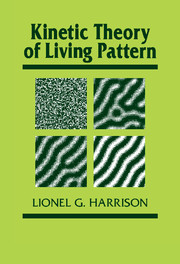Preface
Published online by Cambridge University Press: 22 September 2009
Summary
Once upon a time I was a physical chemist working chiefly on the reactivity of sodium chloride with rather simple gases, and never on a complex organism, not even anything with a carbon atom in it. This book is the product of a change of field which started twenty years ago. This Preface must serve both to acknowledge those people who were most important in bringing about that change and to argue the case for the possible utility of a classical physical chemist in biological theory.
In 1971 my colleague Dr. R. E. Pincock gave a seminar on an instance of spontaneous optical resolution which he had discovered: Supercooled liquid 1, 1′-binaphthyl in a sealed vial, when induced to crystallize suddenly, usually gave an asymmetric product. In some experiments that product contained more left-handed crystals than right-handed ones; in others, the reverse. He claimed that this was closer to truly spontaneous resolution than was Pasteur's crystallization of sodium ammonium tartrate, in which asymmetry was finally achieved only through the intervention of a biological organism, namely, Pasteur himself sorting the crystals into two piles.
Pincock's report presented two problems: first, the philosophical meaning of “spontaneity.” How can asymmetry arise with no apparent antecedent, seeming to defy the precept that asymmetry begets asymmetry? Second, what kind of mechanism can one envisage for this phenomenon? Given this provocation, I published (Harrison, 1973) a speculative kinetic mechanism for the origin of chiral asymmetry in biochemical evolution.
- Type
- Chapter
- Information
- Kinetic Theory of Living Pattern , pp. xiii - xxPublisher: Cambridge University PressPrint publication year: 1993

